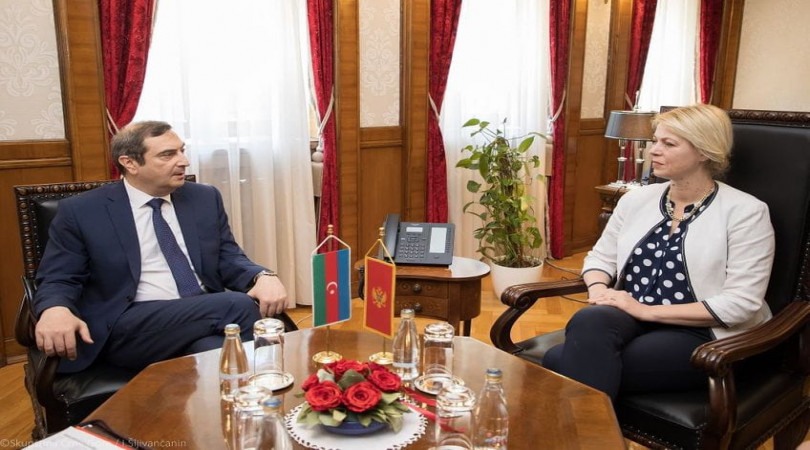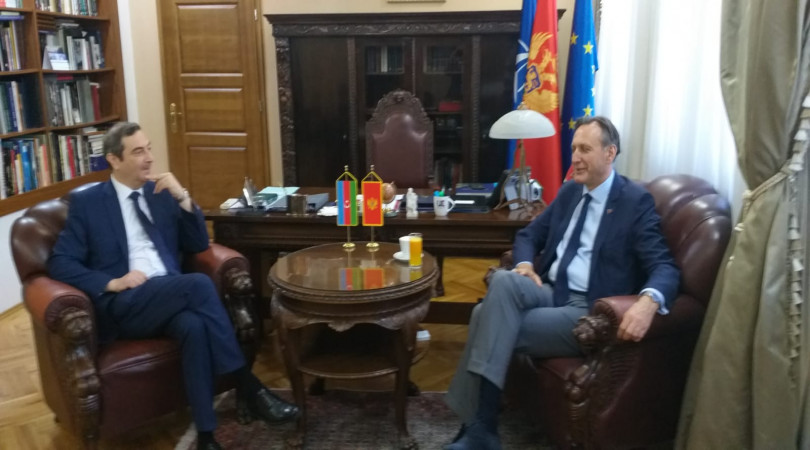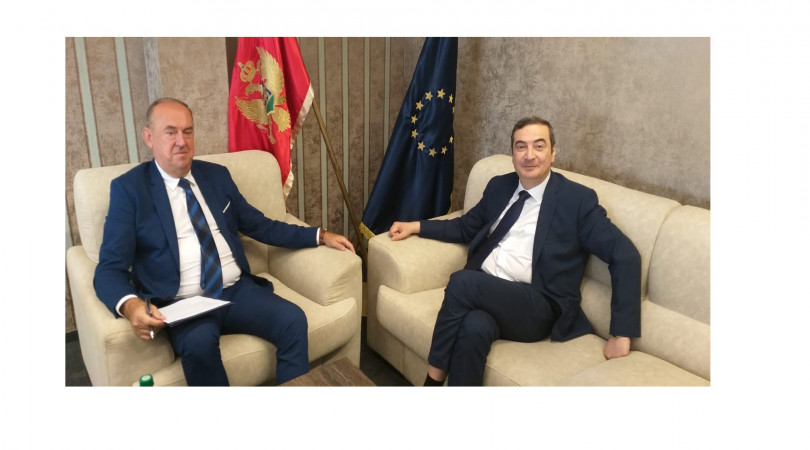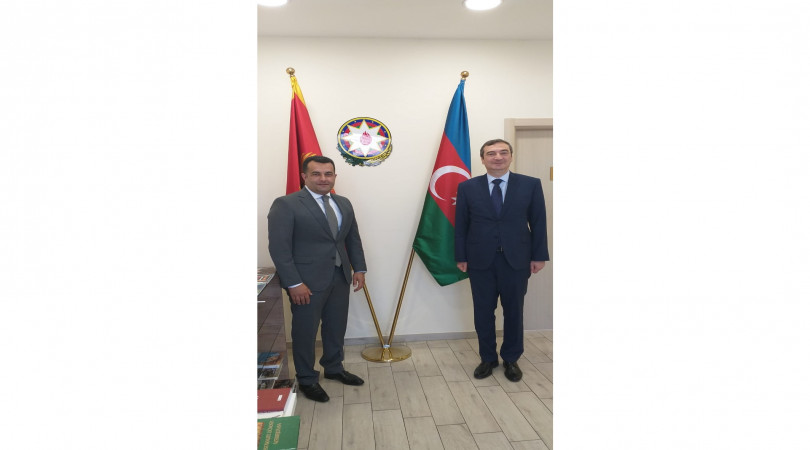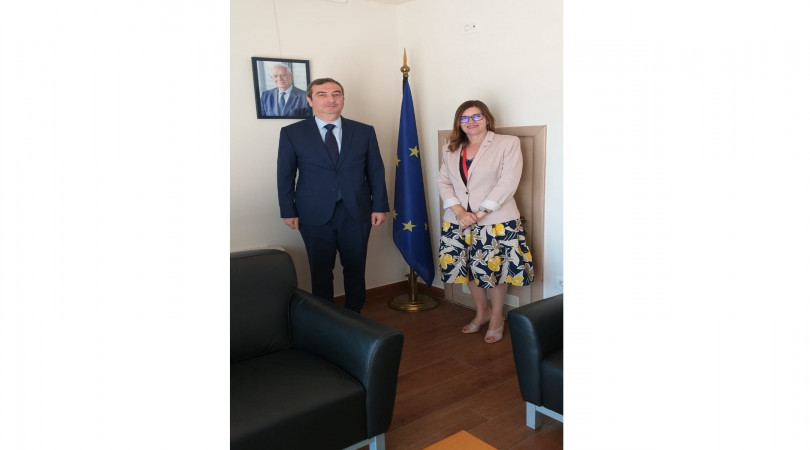OSCE PA Silk Road Support Group`s international conference held in Baku
An international conference of the Silk Road Support Group of the OSCE Parliamentary Assembly has kicked off in Baku. The conference on the theme “The role of parliamentarians in boosting economic co-operation and cultural ties along the Silk Road”, is co-organized by the Milli Majlis and the OSCE PA Silk Road Support Group.
Opening the conference, Azerbaijani MP, vice president of the OSCE PA Azay Guliyev said the event will feature several panel meetings on the strengthening of economic and trade relations, facilitation of transport and logistics procedures, and promotion of cultural exchange and dialogue.
The conference will adopt Baku Declaration.
The OSCE PA Silk Road Support Group was established on the initiative of Azerbaijan. Initially consisting of 17 countries, the group now has 22 member states.
Other speakers at the event included Deputy Speaker, head of the Azerbaijani delegation to the OSCE Parliamentary Assembly Bahar Muradova, President of the OSCE Parliamentary Assembly George Tsereteli and President of the Parliament of Montenegro Ivan Brajovic.
Addressing the event, Azerbaijan`s Foreign Minister Elmar Mammadyarov said: “Being one of the founding pillars of cooperation in OSCE – and to some extent, even more fruitful in terms of deliverables than others – this involvement dates back to 1975 when the participating states reaffirmed in the Helsinki Final Act the substantive importance of economic dimension in the OSCE concept of a comprehensive security. In doing so, they recognized that the improvement of the conditions of transport and eliminating technical obstacles to trade constitute one of the essential factors in the development of cooperation among member states.”
FM Mammadyarov stated: “No doubt, trade facilitation and promotion of intra- and trans-regional infrastructure connectivity through building efficient multimodal transport corridors can and will contribute to a sustainable economic growth in the OSCE area. Particularly, the 2016 Hamburg OSCE Ministerial Council decision on good governance and connectivity, as well as all relevant previous transport-related OSCE documents and decisions, provides a useful framework for cooperation in this regard.
However, we have to make the process of contribution more inclusive and here, I would like to emphasize the role of the parliamentarians in promoting the agenda of connectivity. The Ministry of Foreign Affairs of Azerbaijan welcomes the establishment of the Silk Road Support Group as it was mentioned by Mr. Azay Guliyev. Today, there are 22 participating States. Probably, this number will grow. I believe this group totally serves as a platform for dialogue on the matters of regional transport infrastructure as a crucial element for strengthening trade corridors. I think that it is one more element that this Group can contribute to the agenda on promotion of connectivity in the region. Seeing you in Baku for wide discussions is not a coincidence.”
The foreign minister noted: “Over the past years my country has taken significant steps in the development of the non-energy sector, in particular, by investing in and building transport infrastructure not only in Azerbaijan, but also across the region. However, in order to successfully support and develop those inter-regional trade corridors through Azerbaijan, it was necessary to achieve and ensure a solid sustainable political and macro-economic stability in the country. In this regard, Azerbaijan had already proved itself a few years ago when it provided a favourable, liberal investment regime for foreign companies in oil-and-gas industry. It is keen to do so again, this time in trade-logistics sector through creating a Free Economic Zone in Alyat, area of Azerbaijan around the new and still expanding Port of Baku. The objectives of Free Economic Zone is to increase the attractiveness of Azerbaijan as a regional trade-logistics hub, which could feed numerous trade routes and the economies of many countries in the region. Its goal to facilitate trade across Europe and Asia which subsequently revitalize the idea about ancient Silk Road by applying modern instruments of trade facilitation and investment promotion. We are hopeful that the adoption of this legislation will further strengthen Azerbaijan’s trade, logistics, and investment ties with Europe and Asia. We are heavily investing in transport links, logistics centres, and the improvement of business and investment environment. All of this serves trade. This is part of President Ilham Aliyev’s vision and philosophy.”
“In line with that objectives, among the main priorities of the Government of Azerbaijan is the development of regional and trans-regional multi-modal transport corridors in partnership with other interested OSCE participating States and neighbouring States along the East-West and North-South axes.”
“Considering the volume of trade between only China and EU being over €500 billion, it is obvious that there should be a diversity of reliable trade routes – not in conflict or competition with each other, but in complementarity to each other. Therefore, Azerbaijan, Kazakhstan, Georgia, and Ukraine have crafted the Trans-Caspian International Transport Route as a cornerstone of its East-West trade corridor strategy, whose prime objective is to link Europe with East Asia. This is a corporate-institutional undertaking of railway companies, sea ports, and maritime companies of the involved countries. The bi-directional trade flows along this route can take place through Black Sea and Turkey. We are pleased to see that countries such as Turkey, Ukraine and Poland also joined this route development. Besides, in Romania and Bulgaria there are signs of an increasing interest in joining this trade route as well. Our initial estimation is to transit some 3-4 million tons of goods during next years and then, subsequently to achieve the volume of 8-10 million tons per year.
In that regard and with that goal in mind, we have constructed a backbone strategic Baku – Tbilisi – Kars railway with a freight-forwarding capacity of 6-7 million tons at the first stage and its subsequent increase to 17 million tons a year. This railway, commissioned last October and passing through Azerbaijan, Georgia and Turkey, is a key segment of the emerging transcontinental corridor, called New Silk Road, which will link trans-Europe and trans-Asian railway networks and will significantly contribute to a reliable and integrated freight railway connection between Europe and Asia, definitely, will increase transport and transit capacity of those countries involved and will promote economic growth, stability and welfare in the region. It is also expected that Baku-Tbilisi Kars railway will carry one million passengers at the first stage and 3 million passengers in few years that contributes to movement of people across different regions, their well-being, and paving the way for growth in inter-cultural ties. Baku-Tbilisi Kars will create opportunities not only for Azerbaijan, Georgia and Turkey, but also for the countries in Asia and Europe. It is an important connection in the Lapis Lazuli trade and transit corridor, aimed at unlocking trade potential of Afghanistan and its link to Europe,” Elmar Mammadyarov said.
“It is no coincidence that many countries in and beyond the Caspian region and Central Asia expressed their interest in using this railway for their trade purposes. EU’s statement on welcoming the entry into operations of this railway was a sign of recognition of importance of this project not only for this immediate region, but also for Europe as well. It is noteworthy to mention that Azerbaijan is keen to explore the perspective of cooperation in the field trade-to-transport with EU. Not limiting ourselves to statements or declarations, we would like to see how in practical terms European Union support and contribution to the process of extension of Trans-European Transport Networks to Azerbaijan and to its trade corridors. And signing on the High-Level Document on this issue together with Vice-President of the European Commission Madame Mogherini last November was the reflection of Azerbaijan’s commitment to realize BTK’s and other projects’ shared benefits and vision with our European partners.
There is also another trade corridor– that is, South-West international transport route, whose purpose is to bridge India, Iran, Persian Gulf countries with Turkey and Europe. Railway authorities of Poland, Ukraine, Georgia, Iran, and Azerbaijan are jointly developing this route. In addition to this, the discussions held with the German railway company Deutsche Bahn and globally renowned DB Schenker indicate that there is a strong commercial interest of leading logistics companies in this trade-creative projects. And indeed, the cumulative trade among the countries, whose markets are to be served through South-West corridor, equals to over 200 billion USD. The potential for this trade corridor is immense.
Azerbaijan is also actively engaged in further development of the North-South transport corridor that will enable transit of cargo from the Gulf countries via Iran and Russia to Europe. We joined the International North-South Transport Corridor in 2005, and since then has taken a series of significant steps and decisions to facilitate trade flows between the northern Europe, Germany, Russia on one side and South-West Asia and South Asia on the other. The forecast of trade flow through this corridor ranges between 3 million tons a year during the first years of full-scale operation and up to 20-30 million tons of goods in its subsequent stages of development. If we consider the multiplicity of routes in this corridor between various parts of Europe and Asia, we are basically talking about tapping into the potential of trade worth some 20 billion USD in annual terms.
Another priority area of the Government of Azerbaijan in promoting connectivity is good governance in transport and trade facilitation, inter alia, through streamlining import, export and transit border procedures, efficient trade formalities allowing more transparent customs processes in transit and trade. Particular attention is given to introduction of information technologies in trade facilitation measures such as e-declaration system based on e-signature principle. And I am sure you will hear about some of those peculiarities from different speakers today.
In conclusion, let me emphasize that promoting connectivity and economic cooperation can contribute to a regional security, provided that development of mutual economic relations and cooperation in the economic field takes place in full respect of the principles guiding relations among participating States. Exactly those, which are set forth in the Helsinki Final Act. In particular, the full respect for the sovereignty, territorial integrity and political independence of the States. In this regard, I want to recall that in Astana Commemorative Declaration in 2010, the OSCE participating States reiterated their commitment to the concept, initiated in the Helsinki Final Act, of comprehensive, co-operative, equal and indivisible security, which links economic co-operation with peaceful inter-State relations.
It is exactly in such spirit of commitment to peaceful inter-State relations and economic cooperation that Azerbaijan is promoting those trade corridors and transport infrastructure projects. For that purpose, we also have created a web of regional and sub-regional inter-State frameworks to help solidify politically and commercially essential architecture of inclusive regional cooperation. Removing bottlenecks and creating a diversity of regional and inter-regional connectivity projects is one of the priorities of my country in its bilateral relations and in all international and regional economic forums.
Belonging to different religious, economic, or political confessions should not create bottlenecks. However, nations trade with each other, invest into each other’s economies, and support each other based on mutual respect and trust. The objective of Silk Road is a shared benefit for all those who are interested and willing to cooperate. If there is a message that I would like you to take with yourselves whenever you go out of Baku, it is exactly how much Azerbaijan has tried so far, but we are willing to do more in order to contribute to that shared benefits,” the FM added.

